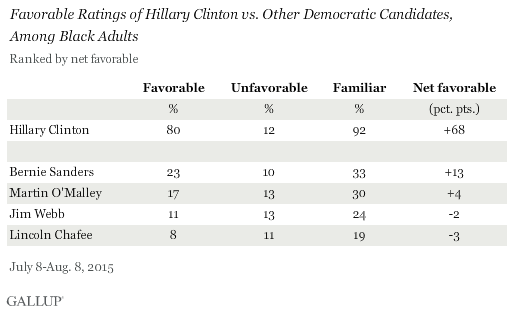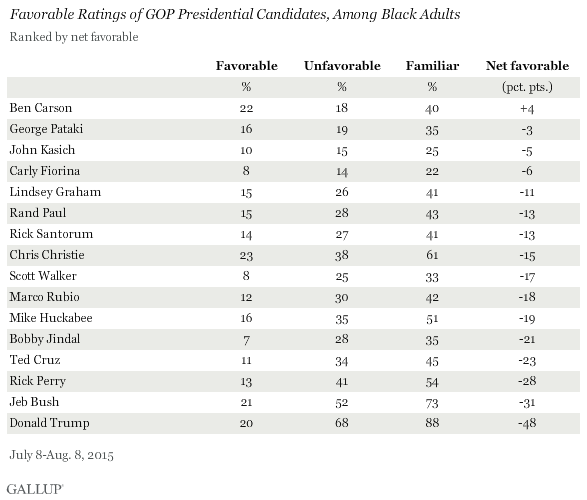Story Highlights
- Clinton's favorability with blacks towers over other Democrats'
- Most Republican candidates have negative image among blacks
WASHINGTON, D.C. -- Hillary Clinton enjoys an 80% favorable rating among U.S. blacks, while two Democratic challengers who have struggled in public exchanges with black activists, Vermont Sen. Bernie Sanders and former Maryland Gov. Martin O'Malley, suffer from low name recognition and favorability among blacks.

These data come from an aggregated sample of data collected from Gallup's Daily tracking, conducted July 8-Aug. 8, 2015. During this time, two candidates, Sanders and O'Malley, had their campaign events disrupted by black political activists, which caused both candidates political angst.
None of Clinton's Democratic competitors, including former Virginia Sen. Jim Webb and former Rhode Island Gov. Lincoln Chafee, has even a 25% approval rating among blacks, and no more than a third of black adults are familiar with the candidates challenging Clinton for the party's nomination.
As a former Cabinet member to the first black U.S. president and as first lady to another president who received strong backing from blacks, Clinton is poised to inherit some degree of popularity with the black community, which has historically thrown its electoral support behind Democrats. But while Clinton may lead among the current declared candidates, if Vice President Joe Biden enters the race, it could threaten her dominant favorability among blacks, because Biden is nearly as well-known as Clinton, and the black community views him quite positively.
GOP Challengers Struggle With Favorability, Name Recognition
Though the Republican Party has historically struggled to attract black voters in modern U.S. politics, there have been some efforts from the party and individual candidates to make their case to black Americans in 2016. But those have done little to alter blacks' positivity toward the GOP, and most GOP candidates for the party's nomination have a negative net favorability among U.S. black adults. Additionally, most GOP candidates are not well-known among blacks, similar to their lower familiarity ratings among Americans more generally.

Just one GOP candidate enjoys a positive net favorable rating among black adults: retired neurosurgeon Dr. Ben Carson. Carson is also the sole black candidate of either party at this point in the race. Still, less than half of black Americans (40%) are familiar with Carson.
Because of former Virginia Gov. Jim Gilmore's recent entry into the GOP race, Gallup has not conducted enough interviews with black Americans to include data for him.
Though the black community views New Jersey Gov. Chris Christie and former Arkansas Gov. Mike Huckabee mostly unfavorably, they have the highest net favorability ratings among the candidates with whom a majority of blacks are familiar. This positions Christie and Huckabee better to make inroads with the black community as opposed to candidates such as former Texas Gov. Rick Perry and former Florida Gov. Jeb Bush, whom blacks view highly unfavorably -- for example, a majority of blacks (52%) rate Bush unfavorably.
Hands down, Donald Trump is the candidate who will struggle most among blacks. Trump's familiarity among blacks is about on par with Clinton's, but he is deeply disliked. Nearly seven in 10 blacks have an unfavorable view of him -- by far the highest negative opinion of any candidate.
Bottom Line
Though the 2016 Democratic primaries are still six months away and the general election more than a year away, Clinton is solidly positioned with blacks, given her high familiarity and positive ratings among the group. Although favorable ratings do not translate directly to electoral support, she fares arguably better among black voters than any other Democratic or Republican candidate at this point in the campaign. Competing Democrats would likely compete better with Clinton for the voting bloc if they boosted their name recognition and, at the same time, boosted their positive image.
Republicans, in contrast, would need to chip away at their poor image among blacks. But they may have a tough time making their case to blacks as to why their policy positions are beneficial to the black community. Several governors or former governors in the race, including Bush, Walker and Perry, have made efforts to limit or eliminate early voting and make the voting process more difficult in general -- moves that are widely seen as a rebuff to blacks who don't usually vote for GOP candidates. And many of the candidates have been attacking the Affordable Care Act, even though the White House says it disproportionately benefits black Americans.
At first glance, it may seem impossible to compete with Clinton for the black vote, but a strategy of tapping into her reservoir of black support and eroding a sturdy leg of her base could make all the difference in a tight primary or the general election.
Survey Methods
Results for this Gallup poll are based on telephone interviews conducted July 8-Aug. 8, 2015, on the Gallup U.S. Daily survey, with a random sample of 1,684 black adults, aged 18 and older, living in all 50 U.S. states and the District of Columbia. Each candidate was rated by a random subset of respondents during this time period, with the sample sizes rating each candidate ranging from 414 to 490. For results based on these samples, the margin of sampling error is ±6 percentage points at the 95% confidence level.
The base sample of national adults used in this research includes a minimum quota of 50% cellphone respondents and 50% landline respondents, with additional minimum quotas by time zone within region. Landline and cellular telephone numbers are selected using random-digit-dial methods.
Learn more about how Gallup Poll Social Series works.

